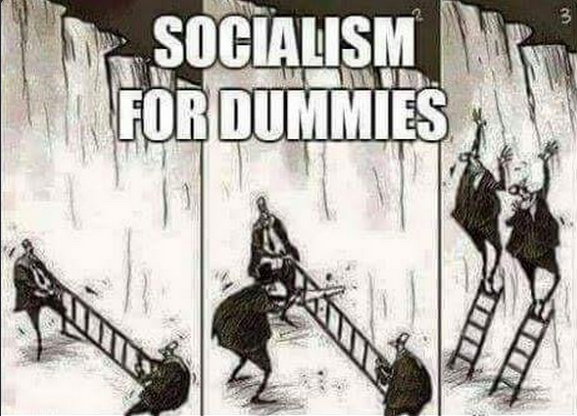PureX
Veteran Member
Let's say there are only two gas stations in a town. One on the east side and the other on the west. And until now, they have both charged the same price per gallon of gas, thinking that if they raise it, their customers will go to the other station for gas. But today, the owner of the eastern gas station decides that this is not the case. He decides that his customers are not going to bother driving all the way to the other station to get their gas if he raises his own gas price by a penny per gallon, because the cost of the drive would erase the savings gained by it. So he does raise his price by a penny. And it turns out that he's right. People don't bother driving across town to save one penny per gallon on their gas.
Now, the owner of the west side gas station sees this, and sees that he has gained no new customers by keeping his gas price a penny lower, so he decides to raise his gas price by two pennies, thinking that if it worked for the west side owner, it'll work for him. And it does! Because even though he has raised his gas price by two cents per gallon, his patrons would still have to pay one cent per gallon more if they drove across town. So all they would be saving themselves is one cent per gallon, and that savings would be eaten up by the extra mileage. So they pay the two cents more for the convenience of not driving to the other side of town for their gas.
Now let's say this little 'price war' goes on for a while, and it results in both station owners charging 10 cents more per gallon for their gas, because the only alternative for their customers is to drive to the next town to buy cheaper gas. And, of course, the drive would just use up ten cent-per-gallon savings on the extra mileage incurred, getting there and back. So they aren't happy about it, but they have to pay the high price, because they have to have gasoline for their cars.
And anyway, we all know that the station owners in the next town will raise their prices accordingly because the station owners in the first town did, and they got away with it.
The problem, here, is that people have to buy gas for their cars, and the people providing that commodity all know it. So the sellers are not going to compete with each other for the lowest price and biggest share of customers. That would only hurt their profit margin (giving more, and getting less). Their goal is not to sell more product, but to sell less product for significantly more money. Because they profit more by giving less out and taking more in. And they ALL share this same goal. So they don't have to meet in back rooms and price-fix to pursue it. They will collude simply by all pursuing the same goal. Price-fixing and price gouging are technically illegal, and so is collusion, but they are nearly impossible to prove when the participants never have to meet or even speak to each other, to do it.
A captive market is a market in which the buyers have to buy from someone, and the sellers all know it. It changes the dynamics considerably when the buyers cannot refuse to buy. As they can in a "free market". Here in the U.S. most of us think we are living in a "free market economy". But in fact everything that we NEED TO BUY to live in a modern, interdependent society is in fact being sold in a captive market. And for that reason the prices go up until the greater portion of buyers simply cannot pay any more than they are.
Now, the owner of the west side gas station sees this, and sees that he has gained no new customers by keeping his gas price a penny lower, so he decides to raise his gas price by two pennies, thinking that if it worked for the west side owner, it'll work for him. And it does! Because even though he has raised his gas price by two cents per gallon, his patrons would still have to pay one cent per gallon more if they drove across town. So all they would be saving themselves is one cent per gallon, and that savings would be eaten up by the extra mileage. So they pay the two cents more for the convenience of not driving to the other side of town for their gas.
Now let's say this little 'price war' goes on for a while, and it results in both station owners charging 10 cents more per gallon for their gas, because the only alternative for their customers is to drive to the next town to buy cheaper gas. And, of course, the drive would just use up ten cent-per-gallon savings on the extra mileage incurred, getting there and back. So they aren't happy about it, but they have to pay the high price, because they have to have gasoline for their cars.
And anyway, we all know that the station owners in the next town will raise their prices accordingly because the station owners in the first town did, and they got away with it.
The problem, here, is that people have to buy gas for their cars, and the people providing that commodity all know it. So the sellers are not going to compete with each other for the lowest price and biggest share of customers. That would only hurt their profit margin (giving more, and getting less). Their goal is not to sell more product, but to sell less product for significantly more money. Because they profit more by giving less out and taking more in. And they ALL share this same goal. So they don't have to meet in back rooms and price-fix to pursue it. They will collude simply by all pursuing the same goal. Price-fixing and price gouging are technically illegal, and so is collusion, but they are nearly impossible to prove when the participants never have to meet or even speak to each other, to do it.
A captive market is a market in which the buyers have to buy from someone, and the sellers all know it. It changes the dynamics considerably when the buyers cannot refuse to buy. As they can in a "free market". Here in the U.S. most of us think we are living in a "free market economy". But in fact everything that we NEED TO BUY to live in a modern, interdependent society is in fact being sold in a captive market. And for that reason the prices go up until the greater portion of buyers simply cannot pay any more than they are.
Last edited:


